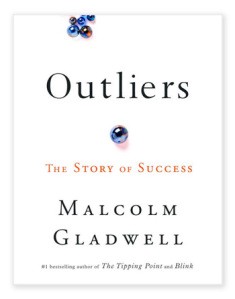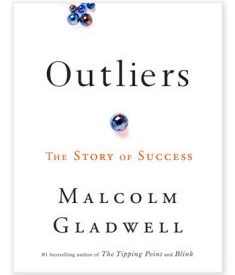Malcolm Gladwell

Outliers is a book about success ? or rather, the myths surrounding it steeped in our culture. The central theme of this book is that the success of Outliers, the people that break the norm and succeed, has less to do with nature and more to do with nurture:
Opportunity
From being born in the right place, to being born in the right month ? opportunity presents itself quite arbitrarily. The lucky few get access to the time, coaches, equipment, etc. to develop their skills to the fullest. This dramatically compounds the difference between them and their peers, resulting in a very deliberate carving out of an outlier.
10,000 hours
This book introduced the magic number of 10,000 hours ? the amount of time you need to practice a skill before you become an expert at it. To come up with this number, Gladwell looked at various fields from art to business, sports, music, etc. and realized that deliberate practice, not some innate talent, is the primary reason people become so good at things.
Timing
The decade you?re born matters a lot to your overall outcome. Some of the wealthiest people in history were born in the 1860s and 1870s ? they rode out the industrial revolution wave. Some of the top Silicon Valley entrepreneurs were born between 1953 and 1956 ? Steve Jobs, Bill Gates were both born in 1955!
Upbringing
The quality of your upbringing has more to do with your life?s outcomes than your pure intelligence. Involved parents are the most crucial factor for an individual?s success in life. They talk to their kids more. They put them in summer schools, take them to museums, help them with their homework ? all these provide more opportunity for the individual to excel.
Meaningful Work
To become an outlier, to do great work, you have to believe that there is a real purpose to the work you put in. Immigrant families raise their kids in an environment where hard work is valued and practiced ? that in itself is an end, and that leads to a higher rate of successful professionals amongst second-generation immigrants.
Legacy
Legacy is the values passed down from one generation to the next. These values drive our behavior. My favorite example of the book was how Gladwell connected over-reliance on rice cultivation in Chinese cuisine to their higher ability at math ? when enough care and hard work is put in, you can dramatically increase rice output per unit of land, which is not as true for other crops.
I?ll keep this review short and end it here. As always, I really enjoy Gladwell?s books and hopefully will get around to his last two books ? What the Dog Saw and David and Goliath ? some day. Next week, I?ll review How Will You Measure Your Life by Clayton M. Christensen, James Allworth, and Karen Dillon.
This is #23 in a series of book reviews published weekly on this site. You can read the rest of them here.
 Photo by Jeroen den Otter on Unsplash
Photo by Jeroen den Otter on Unsplash


